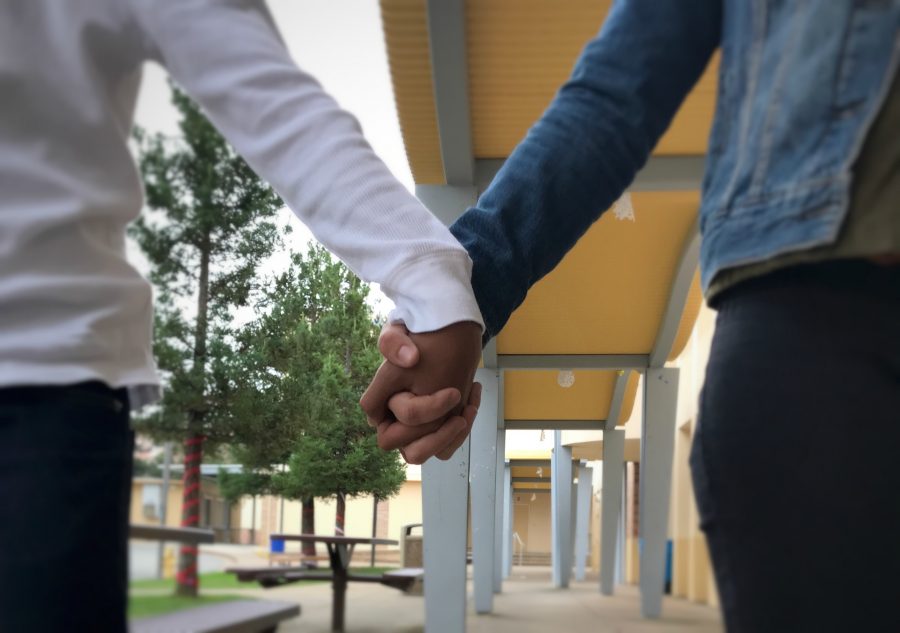Laws prohibiting interracial relationships are history, and although interracial relationships have come a long way, many continue to face barriers.
Though people today are less restricted as a result of their race, it still affects people’s view of relationships, even in the Carlmont community.
Kazim Haider, a junior, knows what it means to be in an interracial relationship.
“My parents were both born in Pakistan, but ancestrally I am Arabic and Persian. Race has been a factor mainly in a cultural aspect, but [my girlfriend’s] family is very accepting and mine are as well to an extent, even with cultural ‘buttons’ being pushed,” said Haider.
Sophomore Jayden Kuhn has a different situation. Kuhn experiences the effects of an interracial relationship, with a white father and a black mother.
“Most people generally think I’m straight black. They are actually kind of surprised when I tell them I’m half white. They depict me in a different way based on how I look,” said Kuhn.
Kuhn added that when his youngest brother was born, most of his friends focused on what color his skin was.
“Everybody said stuff like ‘Oh, he’s white,’ and ‘your dad won,’ but it’s a baby. It doesn’t really matter what the skin color is; he’s just my brother,” said Kuhn.
Instructional Vice Principal Jennifer Cho has been in an interracial marriage for eleven years and has personal experience with the different reactions from people.
“The thing I was most uncomfortable with is people making fun of my husband’s nationality. When something is new or different and people don’t know how to react, our natural response is to joke or tease or make fun,” said Cho.
Other people’s opinions can cause conflict in interracial relationships.
“There have been some opinions, and I have ignored them. My only fear is that this aspect of our relationship will take a toll on [my girlfriend], something she would not have to worry about if I was of a different race,” said Haider.
The Carlmont community makes an effort towards including all people from all backgrounds with offering different clubs and having spirit days surrounding acceptance, but a positive environment can only go so far.
People enter high school with their own opinions and ideas, to which they are all entitled. Not everyone’s views are the same, even in the mostly liberal Bay Area.
“It’s definitely a personal thing. Each individual’s thoughts depend on their life experiences and how they were raised,” Cho said.
Not only can individual opinions influence interracial relationships, cultural and family beliefs can as well.
“Another thing that is complicated is navigating the expectations of each culture and its traditions. His family has certain expectations of how wives should be and/or what their roles are, whereas my culture has a whole different side of expectations and so that is always challenging,” said Cho.
Despite today’s positive shift towards acceptance of racial diversity, there are still some challenges.
Some students personally encourage same-race relationships, and some do not. The lack of romantic intermingling of students could come from fear of what peers would think.
“Sometimes people will ask if I’m into white girls and say I should stay within my own race,” Kuhn said.
The lingering challenges unique to interracial relationships are in part rooted in historical legal constraints.
Until 1967, many laws prohibited miscegenation, or interracial marriage, children, and the making of children, and was considered taboo amongst the masses. This was all until 1959, when Mildred Loving, a black woman, and Richard Loving, a white man, were sentenced to a year in prison after marrying outside of their native state, Virginia, where it was illegal.
According to the New York Times, Mildred Loving’s case was brought to the Supreme Court. Eventually, this resulted in the removal of all laws prohibiting miscegenation in 1967.
Even today, there are unresolved barriers surrounding the intermixing of races.
“There’s a lot of defense around a person going outside of their race to date. Recently it has gotten much better and more widely accepted, but there are still some people who have different perceptions about that,” said Cho.
Kuhn isn’t affected by what others say and doesn’t believe anyone should be.
Kuhn said,“I think you really should be free to like who you like and love who you want.”


